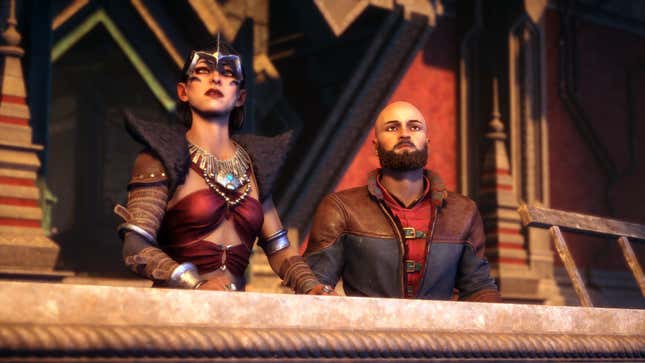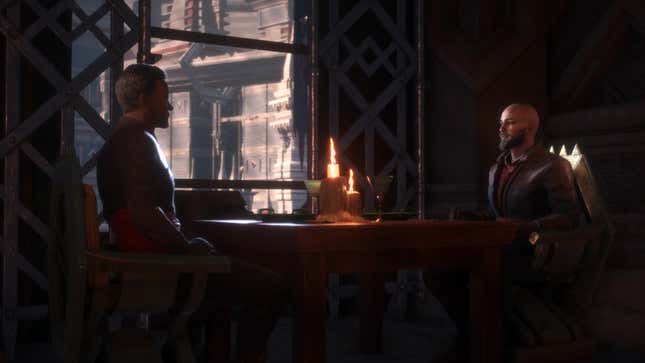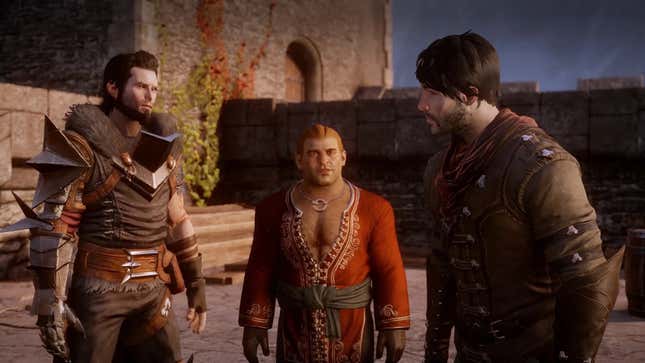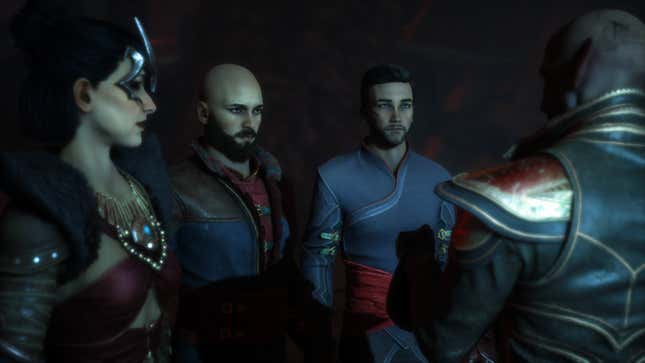Dragon Age: The Veilguard had a lot to live up to. Its predecessor, Dragon Age: Inquisition, launched in 2014 and left the series on a devastating cliffhanger, a cliffhanger that went unresolved as developer BioWare went through 10 years of development hell and internal reboots, before ultimately making its way to a divisive game that resembles the legendary releases of the studio’s golden era. But as much as The Veilguard can be defined by its similarities to games of the past, so, too, is it notable for its differences. More than probably any sequel BioWare has put out in nearly 20 years, The Veilguard makes a calculated attempt at a clean break from previous games in its series in terms of choice and consequence. It lets you recreate one of your old heroes, but only import three choices, significantly fewer than previous games. Inquisition in particular dwarfed this, using a companion app to let you painstakingly create a world state shaped by hundreds of previous choices.
Exploring just why this decision to drastically reduce the number of choices that get imported into The Veilguard relative to earlier games in the series is so important requires tackling a fundamental question about what the series truly is. Is it an anthology putting multiple heroes into a game of hot potato with the universe’s crises? Or could it learn a thing or two from its science fiction sibling Mass Effect, and commit to being a series built on choice and consequence rather than feeling burdened by it? More so than past games, The Veilguard positions the series to go either way, and its failings are evidence that BioWare needs to make a decision one way or another as it moves on to whatever comes next.

BioWare’s messaging on why it made the call to shave cross-game connectivity down to three choices and a character creator has been spotty, with the team claiming they only imported choices they could meaningfully represent. The Veilguard gives us a new, heavily customizable protagonist in Rook, a mercenary recruited by fan-favorite party member Varric, and it takes place in the northern regions of Thedas, far removed from the events of the previous Dragon Ages. Within those parameters, which feel tailored to give BioWare some freedom to leave old choices behind, continuity is one of The Veilguard’s biggest shortcomings. Even in a game as divisive as this one, I’ve yet to hear anyone satisfied with how The Veilguard handles continuity. Sure, the game’s main story brings together years of loose threads in a way that I found satisfactory. It was when it inadequately acknowledged or outright ignored my previous presence in this universe that the cracks started to show.

The Inquisitor, the protagonist of Dragon Age: Inquisition, makes an appearance in The Veilguard as a pre-defined character whose dialogue changes ever so slightly depending on the three choices you import. Overall, we still get a flattened version of that character, one who arguably should have been the protagonist fighting against Solas, the ex-party member turned antagonist. I played my Inquisitor as a resentful atheist dragged into a holy war, but the man who bears his title in The Veilguard only resembles him in voice, not beliefs. In a vacuum, I don’t blame BioWare for not being able to match the very particular story I wrote in my head with a pre-defined character. But that problem could have been solved if I had been controlling him this time around.
The Veilguard only imports three choices, but it doesn’t feel fully disconnected from games of the past. A lot of its narrative comes from worldbuilding we’ve watched unfold over 15 years. Multiple characters like Dragon Age: Origins’ Witch of the Wilds Morrigan, Dragon Age II’s storyteller Varric, and Inquisition’s Tevinter pariah Dorian make appearances throughout the game in roles of varying importance. BioWare carefully writes around the specifics of what you might have done in previous games so each of these party members could have feasibly ended up where they have regardless of what you’ve done. The handling of Dragon Age II’s Isabela is more questionable, as dialogue in The Veilguard heavily implies she was recruited during the second game, though it’s possible to play II without her in your party if you don’t actually get around to asking her to join. This is a very specific scenario that few players probably ever saw, but it’s an example of how, even as BioWare tries to be respectful of past choices (largely by not bringing most of them up), some paths are bound to slip through the cracks.

Admittedly this is the kind of nitpicking that only the sickest of sickos like me could ever engage in because we’re the only ones who even notice, but it’s the trap BioWare has set for itself. Establishing choice, consequence, and carryover as a pillar of your studio’s ethos means that fans can spend years imagining what their decisions might mean in the future, only for the reality to not match the theories that have been spreading through the community as what seemed like huge choices end up being a mere footnote in the grand scheme of things. Some of the biggest choices in previous games ended up funneling to the same outcome, and people were inevitably upset to see that magnified tenfold in The Veilguard’s limited import.
It’s clear that BioWare has aspirations that often get gradually chipped away throughout development as time and resources restrict what’s possible. Fans have datamined Veilguard files that imply some decisions that weren’t imported were meant to be at one point in production, and there’s an art book full of references to choices and consequences that never made it into the final game. Ex-Dragon Age writer David Gaider has been dropping bombs on Bluesky about the logistics of recognizing different decisions in sequels. The actual, realistic possibilities of reactivity in these games will likely never match the expectations. Having existed in online BioWare spaces for over a decade, I know a lot of fans want a diverging main plot in response to their decisions, but that’s often not feasible given the budget and time constraints of AAA games.
That’s the promise we imagine when we talk about choice and consequence, right? Games like Dragon Age: The Veilguard could be, in a perfect world, digital choose-your-own-adventure books or tabletop games that react to every little thing we do with an infinite number of outcomes and branching paths. But if that isn’t feasible, what is reasonable to expect? Mass Effect, despite its problems and some glaring exceptions, was able to deliver on some major choices by the time Mass Effect 3 rolled around thanks to its fixed perspective of protagonist Commander Shepard. Dragon Age has pulled off stunning moments like the Here Lies the Abyss questline, but none of those change the core plot. Perhaps some disappointment over this is on fans for not having more measured hopes, but I can’t help but feel like Dragon Age is fundamentally ill-equipped to deliver the choice and consequence that BioWare’s pedigree has conditioned people to expect.

Dragon Age is, ostensibly, an anthology. It jumps around the world of Thedas and, with each new entry, gives us a new protagonist to inhabit and a different problem to solve. Meanwhile, it also imports choices from previous games as it teleports us to the other side of the universe. Dragon Age has always wanted to have its cake and eat it too. The stories it tells are so directly tied to the people at their center that the protagonist switch that occurs with each new game has always felt like an arbitrary choice, not one that actually serves the tales it’s telling. The Veilguard’s flattening of the Inquisitor was the most damning example, but Inquisition’s transition from Dragon Age II’s Hawke to the Inquisitor was hardly seamless. Corypheus, the antagonist of Inquisition, debuted in Dragon Age II’s Legacy DLC and was directly tied to the family lineage of Hawke. When the Champion of Kirkwall appeared in Inquisition as a customizable NPC, they were similarly flattened and also unwilling to stick around to solve the problem they’d started in the previous game. When the heroes we embody are so quickly discarded, even when they have deep personal ties to what’s going on, is it so surprising that the minutiae also falls down the chasm with them?
Now that The Veilguard has only imported three choices, none of which acknowledge the specifics of the larger world, it’s interesting to look at the game and realize that a lot of its big decisions feel more insular than those in previous games, like they might not need to be imported into the next one. Broadly, the main plot of stopping the elven gods doesn’t change no matter what you do, and even the final choice is more about deciding the flavor with which the same final event happens. Most of the variables you can alter happen within the story of The Veilguard, rather than the story of Dragon Age writ large. That isn’t to say the game isn’t gesturing toward the future; it’s just that there are fewer choices that feel like they’re being put on a shelf to be examined later, even as the game essentially wraps up most of the lingering lore threads of the past and paves the way for a new conflict.
All that being said, the final image we see in The Veilguard is a Marvel-esque tease indicating that the titular group “remains vigilant.” BioWare has already confirmed that it has no DLC plans for the game as it shifts focus to the fifth Mass Effect, so whatever comes next, it sounds like the party is going to play some part in the next game. And after seeing the way The Veilguard handled the Inquisitor, I don’t want the same fate to befall Rook, with them turned into another flattened version of a previous Dragon Age protagonist. If The Veilguard essentially wipes the slate clean, BioWare has the opportunity to go one of two ways: doubling down on the anthology format that hasn’t worked for the series and gradually making choice and consequence a smaller pillar of its identity, or trying something more focused that doesn’t have to draw from every side of the universe but can better represent player choice.

This has been my 1600-word lead-up to my real point: Rook should be the protagonist of the next Dragon Age game. Many of The Veilguard’s big decisions feel so tied to them, their relationships, and their experiences as a mercenary dragged into a leadership role, that they feel primed to serve as the face of the franchise moving forward. They’ve found alliances across all of northern Thedas, have storylines that don’t seem tied up yet, and their arc in The Veilguard seems destined for more stories. Just because Dragon Age has handed off old conflicts to new heroes with each new game in the past doesn’t mean it has to keep doing so. If BioWare wants a fresh start, it’s the perfect time to try something new.
Dragon Age’s biggest problem with continuity was never that carrying choices over in a meaningful way was impossible, it was that its constant expansion in scope and shifting perspective made it more difficult to craft stories that satisfactorily reflected the choices made. The Veilguard can serve as a new beginning. Letting it function as a kind of narrative starting point from which to branch out, along with letting Rook provide a consistent perspective through which we can experience the chapter or chapters to come, all approached with more forethought than we’ve seen the series demonstrate in the past, would be the best use of this game’s potential.
If we’re shedding the old to make way for something new, it’s worth examining the shortcomings of the past. I don’t know what BioWare has planned for the next Dragon Age, but I would love to see the studio take a leap of faith with a hero who hasn’t been sanded down into an NPC yet. Dragon Age has had multiple chances to find its own Commander Shepard. The best time to do it would have been when the Inquisitor was in the spotlight ten years ago. The next best time is right now. Rook spends all of The Veilguard learning to be a leader, and now that the training wheels are off, maybe it’s time to let one person steer the ship.
Source link











Add comment